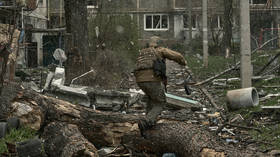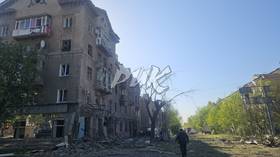EXCLUSIVE: Man who runs SOHR admits to RT he last visited Syria 15 years ago
The UK-based Syrian Observatory for Human Rights has been feeding news about the Syrian war to many media outlets, claiming to have a wide network of contacts on the ground. RT caught up with its director to find out how trustworthy those sources are.
Recently RT went to investigate what makes SOHR so popular with the mainstream media. Journalist and prankster Nimrod Kamer, who volunteered to help find out the answer, travelled to the Midlands to see the headquarters of the Observatory and speak to its director.
Kamer had no luck catching Rami Abdulrahman at home, however. Calling him on the phone, he found out the man went out to a shop. The director of the Observatory sounded very distressed on the phone, talking about the dangers of meeting up for daytime interviews because “they are trying to kill me.”
Who is behind Syrian Observatory for Human Rights? @nnimrodd investigates http://t.co/CnmnpK6ogbpic.twitter.com/8bb4WK4HzX
— RT (@RT_com) October 3, 2015Soon after RT found out that Abdulrahman was headed to Kazakhstan, although no further details were clear. But tracing the steps of the Syrian opposition was a big help. They got together for a conference in one of the Kazakh capital's lavish spots. The head of the SOHR also attended the conference, and, after a bit of wrangling, agreed to answer a couple of questions from RT.
"We are under attack simply because we tell the truth what's going on in Syria. Apparently nobody wants to hear the truth," Abdulrahman told RT’s Ilya Petrenko.
The organization claims to have a wide network of contacts in the region who feed their information to the head office, where it is processed and then posted on the SOHR website, Facebook and Twitter accounts.
RT asked Abdulrahman whether he personally knows "hundreds of people," as he himself puts it, working in Syria for SOHR, and whether he can really trust all of them.
"I know all of the activists working for the SOHR," he replied.
When RT wondered when the last time Abdulrahman actually went to Syria was, he said it was 15 years ago.
"But I know some of the Observatory activists through common friends. This organization only takes new members following a six-month trial period and the candidate has to be familiar to someone from the organization or to a reliable outside contact," he said.
Since the start of its anti-terror campaign in Syria, Russia has got in SOHR reports, which were quickly picked up by major Western media outlets. One of the latest wires from the Observatory, alleging that "Russian warplanes killed 30 civilians in Homs including women and children,” made headlines worldwide on October 1.
Interestingly enough, the same wire published on the Arabic version of the SOHR website on the same date did not mention any Russian warplanes. It said: "27 civilians dead in airstrikes by Assad regime air forces.













